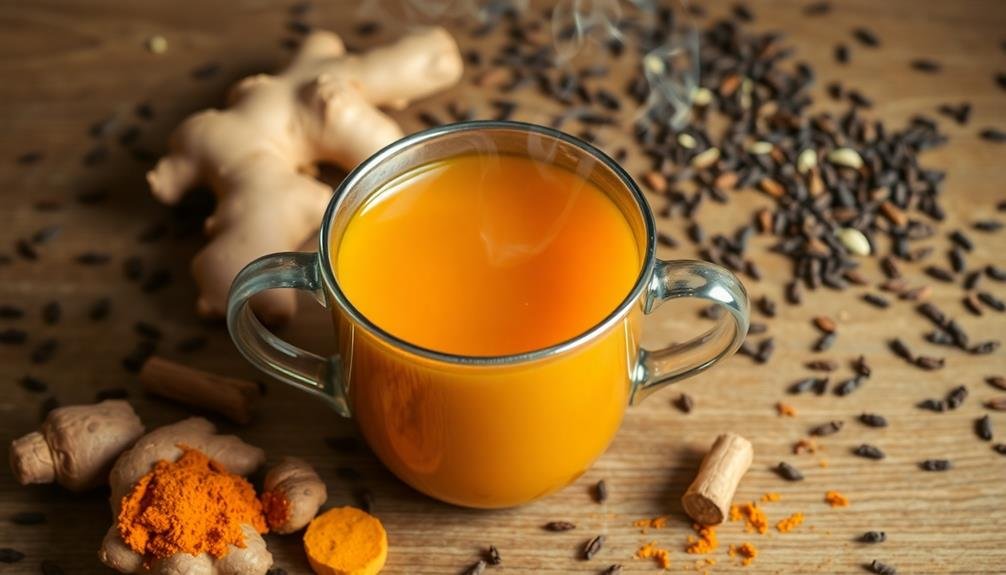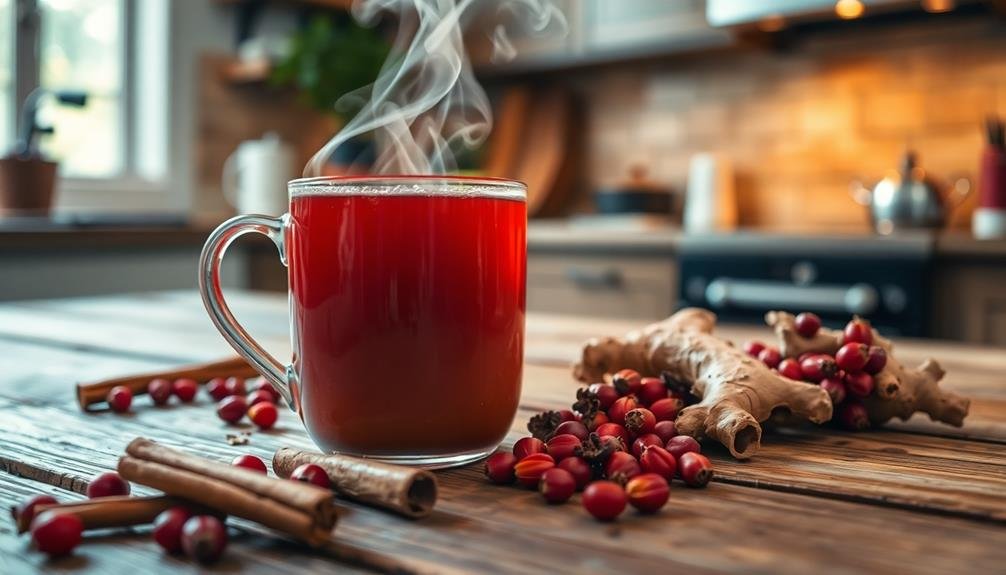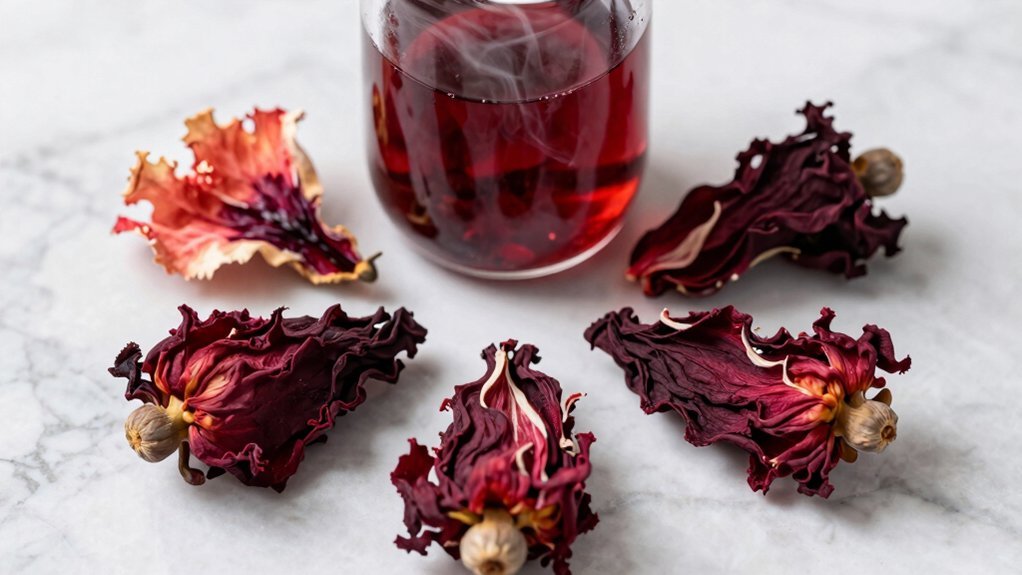Looking for natural relief from joint pain? Try these five herbal tea blends: Turmeric and Ginger Infusion, Willow Bark Blend, Boswellia and Licorice Root Tea, Nettle and Peppermint Fusion, and Rosehip and Cinnamon Elixir. Each blend combines powerful anti-inflammatory ingredients to soothe discomfort and promote joint health. You'll find unique flavors and benefits in each tea, from the aspirin-like effects of willow bark to the cooling sensation of peppermint. Remember to consult your healthcare provider before starting any new herbal regimen, especially if you're on medication. For maximum benefits, consistency is key. Discover how these natural remedies can transform your joint pain management routine.
Turmeric and Ginger Infusion

Combining two powerful anti-inflammatory ingredients, turmeric and ginger create a potent herbal infusion for joint pain relief. This golden-hued tea blend harnesses the active compounds curcumin from turmeric and gingerols from ginger, both known for their ability to reduce inflammation and ease joint discomfort.
To prepare this soothing infusion, you'll need fresh or dried turmeric and ginger roots. Start by grating or finely chopping equal parts of each root. Add one teaspoon of the mixture to a cup of hot water and let it steep for 10-15 minutes.
For enhanced absorption, consider adding a pinch of black pepper, which can increase curcumin's bioavailability. You can enjoy this tea up to three times daily for maximum benefits.
It's best consumed warm, but you can also prepare a larger batch and store it in the refrigerator for up to three days. Remember that consistency is key when using natural remedies for joint pain.
While you might experience some relief shortly after drinking the tea, it's the regular, long-term consumption that often yields the most significant results in managing joint pain and inflammation.
Willow Bark Blend
Willow bark has been used for centuries as a natural pain reliever, making it an excellent addition to your herbal tea arsenal for joint pain management. This powerful herb contains salicin, a compound similar to aspirin, which can help reduce inflammation and alleviate discomfort.
To create a soothing willow bark blend, you'll want to combine it with other complementary herbs. Here's a table of potential ingredients and their benefits:
| Herb | Benefits |
|---|---|
| Willow Bark | Pain relief, anti-inflammatory |
| Meadowsweet | Additional salicylates, stomach-soothing |
| Boswellia | Reduces joint inflammation |
| Devil's Claw | Alleviates arthritis pain |
| Licorice Root | Anti-inflammatory, improves flavor |
To prepare your willow bark blend, steep 1-2 teaspoons of the mixture in hot water for 10-15 minutes. Strain and enjoy up to 3 cups daily. Remember, willow bark can interact with certain medications, so consult your healthcare provider before incorporating it into your routine. While this blend can be effective for managing joint pain, it's not a substitute for medical treatment. If your symptoms persist or worsen, seek professional medical advice.
Boswellia and Licorice Root Tea

Boswellia and licorice root team up to create a potent anti-inflammatory tea blend that can help ease joint pain. These two herbs have been used for centuries in traditional medicine to combat inflammation and provide relief from various ailments, including arthritis and joint discomfort.
To prepare this soothing tea, you'll need to steep a combination of boswellia and licorice root in hot water for about 10-15 minutes. The resulting brew offers a unique flavor profile with a slightly sweet and woody taste. You can enhance the flavor by adding a touch of honey or lemon if desired.
Here are some key benefits of this herbal tea blend:
- Reduces inflammation in joints and muscles
- Alleviates pain associated with arthritis and other joint conditions
- Supports overall joint health and mobility
- Provides antioxidants that help protect cells from damage
- May improve digestive health and reduce stomach discomfort
It's important to note that while this tea can be beneficial for many people, those with certain medical conditions or taking specific medications should consult their healthcare provider before incorporating it into their routine.
As with any herbal remedy, moderation is key, and it's best to start with small amounts to gauge your body's response.
Nettle and Peppermint Fusion
A dynamic duo in the world of herbal teas, nettle and peppermint create a revitalizing fusion that can help alleviate joint pain. Nettle, known for its anti-inflammatory properties, contains compounds that may reduce pain and swelling in your joints.
It's abundant in vitamins A, C, and K, as well as minerals like calcium and iron, which support overall joint health.
Peppermint complements nettle perfectly, offering a cooling sensation that can soothe aching joints. It's packed with menthol, which acts as a natural pain reliever and muscle relaxant.
This herb also boasts antispasmodic properties that may help ease muscle tension around your joints.
To prepare this fusion, steep one teaspoon each of dried nettle leaves and peppermint leaves in hot water for 5-10 minutes. You can drink this tea 2-3 times daily for maximum benefits.
The invigorating taste of peppermint masks nettle's slightly earthy flavor, making this blend both therapeutic and enjoyable.
While this tea can be a helpful addition to your joint pain management routine, it's important to consult your healthcare provider before incorporating it into your regimen, especially if you're taking medications or have existing health conditions.
Rosehip and Cinnamon Elixir

Two powerful ingredients combine to create the Rosehip and Cinnamon Elixir, a soothing blend that targets joint pain.
Rosehips, packed with vitamin C and antioxidants, help reduce inflammation and boost collagen production. Cinnamon, with its anti-inflammatory properties, complements rosehips by improving circulation and easing stiffness.
To prepare this elixir, steep 1 tablespoon of dried rosehips and 1 teaspoon of ground cinnamon in hot water for 10 minutes. Strain and enjoy while it's warm. For best results, drink this tea twice daily.
Here's why you should consider adding this elixir to your routine:
- Supports joint health and mobility
- Reduces inflammation and swelling
- Boosts immune system function
- Improves overall circulation
- Provides a natural source of pain relief
You'll notice a difference in your joint comfort within a few weeks of regular consumption.
Frequently Asked Questions
How Long Does It Take for Herbal Teas to Show Effects on Joint Pain?
You'll typically notice effects from herbal teas on joint pain within 2-4 weeks of consistent use. However, individual responses vary. Some people may feel relief sooner, while others might need longer. It's best to be patient and consistent.
Are There Any Potential Side Effects of Drinking Herbal Teas for Joint Pain?
You should be aware that herbal teas can have side effects. They might interact with medications, cause allergic reactions, or lead to digestive issues. It's best to consult your doctor before using them for joint pain relief.
Can Herbal Teas for Joint Pain Interact With Prescription Medications?
Yes, herbal teas can interact with prescription medications. You should always consult your doctor before combining them. Some herbs may enhance or reduce the effects of certain drugs, potentially causing adverse reactions or reducing their effectiveness.
How Many Cups of Herbal Tea Should Be Consumed Daily for Optimal Results?
You'll typically benefit from 2-3 cups of herbal tea daily for ideal results. However, it's best to consult your healthcare provider, as individual needs vary. Don't exceed recommended amounts, as overuse can lead to side effects.
Are These Herbal Teas Safe for Pregnant or Nursing Women With Joint Pain?
You should always consult your doctor before drinking herbal teas while pregnant or nursing. Some herbs can be harmful to your baby. It's best to err on the side of caution and get professional medical advice.
In Summary
You've now discovered five powerful herbal tea blends to help ease your joint pain naturally. Don't hesitate to experiment with these soothing concoctions and find the one that works best for you. Remember, while these teas can offer relief, they're not a substitute for medical advice. If you're dealing with chronic joint pain, it's always wise to consult your healthcare provider. Enjoy the warmth and comfort of these healing brews as part of your holistic approach to joint health.





Leave a Reply